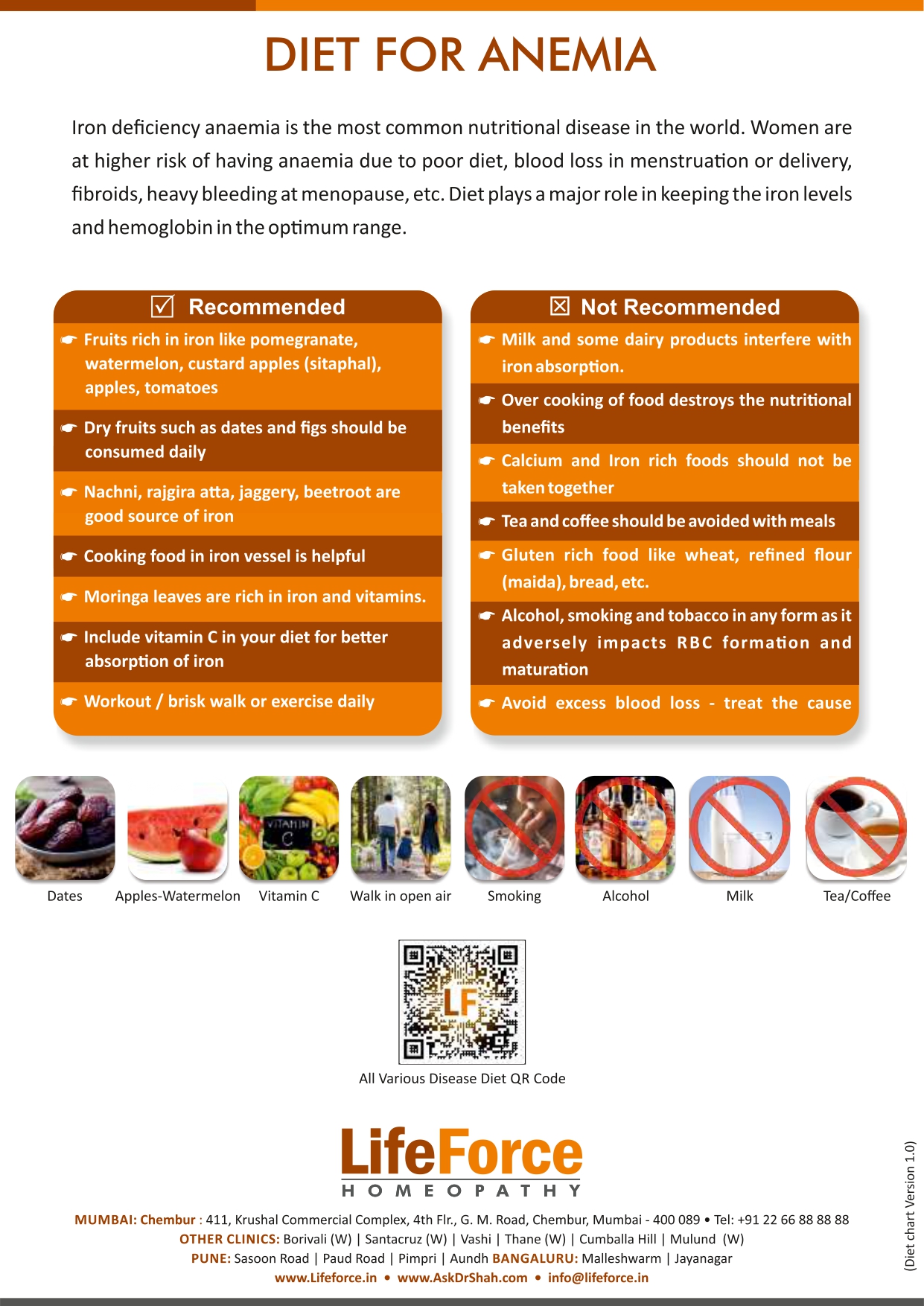 Homeopathic Treatment for Nutritional Anemia
Homeopathic Treatment for Nutritional Anemia
Anemia is the most common of all blood disorders. The term anemia (derived from Greek) means a deficiency of blood.
Anemia results from reduced red blood cell production in the bone marrow. Hemoglobin is the oxygen carrying protein in blood. It is a major component of all red blood cells and gives them their red color. This protein picks up oxygen from the lungs, carries it throughout the body and delivers it to all your cells. In addition, hemoglobin also picks up some of the carbon dioxide produced by the cells and transports it to the lungs from where it is exhaled out.
Cells need oxygen for their basic functions and to keep them alive. Hence, without enough red blood cells to transport oxygen to your cells and carbon dioxide away from your cells, it is like literally suffocating every tissue and organ system in the body.
Symptoms of Nutritional Anemia
Symptoms of anemia are usually very vague and hence, it goes undetected in many people. People tend to ignore these symptoms until they become quite disturbing. Thus, it is necessary to know some of the often ignored symptoms:
- Tiredness
- Pallor (pale appearance)
- Rapid heart beats (sensations of pounding heartbeats)
- Headache
- Dizziness
- Shortness of breath
- Loss of sex drive
- Nervousness
- Depression
- Poor concentration
- Weak memory
- Easy bruising of body parts
- Slow healing of wounds
- Worsening of symptoms of other diseases
- Angina - heart pain from insufficient oxygen
- Claudication - cramped pains in muscles being used.
- Pica - the consumption of non-food items like wax, dirt, paper, grass or hair is often a symptom of anemia.
Must see your physician when?:
- You feel tired for more than five days
- You are unable to perform routine activities
- There is persistent exhaustion with even minimal exertion
- The skin appears pale, and there is fatigue plus breathlessness on moderate exertion.
- Your tongue appears, smooth, shiny and very clean always
- There is yellowish (jaundiced) appearance of the skin.
- Your wounds don't heal soon or when there is presence of bluish-green discolorations under the skin.
Causes of Nutritional anemia:
Causes of anemia can be broadly grouped in to the following categories:
- Insufficient production of red blood cells or hemoglobin
- Starvation/poverty
- Deficient dietary intake of iron, Vitamin B12 and folic acid impairs the bone marrow functions.
- Conditions like cancer, chronic illnesses, allergic reactions to prescribed medications, toxic substances, etc.
- Inherited defects like Thalessemias and sickle cell disease which cause faulty red blood cell structure thus, hastening red blood cell destruction.
- Complete failure of the bone marrow in producing red blood cells is called aplastic anemia
- Increased destruction of red blood cells.
- Increased destruction of red blood cells means they are destroyed before their normal life span is completed. A normal red blood cell lives for approximately 120 days. Many conditions increase their destruction.
- Infectious conditions like malaria Rh-incompatibility in a pregnant mother.
- Loss of blood
- Increased loss of blood when menstruating Silent duodenal or gastric ulcers (common in immuno-compromised, elderly and diabetics)
- Cancers of the intestines
- Any disorder which impairs the coagulability of blood (hemophilia)
Some of the most common causes of nutritional anemia are:
- Iron deficiency
- Vitamin B12 Folic acid deficiencies (these usually occur together)
- Thyroid disorders
- Lead toxicities
- Infectious diseases like malaria
- Alcoholism
- Vitamin E and B6 deficiencies.
- Premature born infants.
- Medications which
- Prevent iron absorption from the gut e.g. 'proton pump inhibitors' in treating acidity, tetracycline etc.
- Cause chronic, mild bleeding from the gut e.g. NSAIDs (ibuprofen, naproxen used widely as pain-killers).
- Aspirin is another widely used medication known to cause mild to moderate bleeding from the gut.
- Hydrocortisones and valproic acid are drugs which cause folic acid deficiencies.
- Vitamin B12 deficiency can be caused by drugs like amoxicillin (antibiotic), and phenytoin (anti-convulsive).
Risk factors fro nutritional anemia:
Ones chances of developing anemia increase particularly if they are:
- Menstruating and having heavy bleeding or excessively long periods (monthly blood loss depletes iron)
- Pregnant
- Lactating
- Athletes (especially endurance athletes)
- An alcoholic
- Vegetarians or vegans
- Using nonprescription drugs and natural remedies whose side-effects are less known.
- Habituated to having tea in excess (tannin in tea causes decreased absorption of iron).
Diagnosis of Nutritional anemia:
Anemia is diagnosed through blood check ups and clinical examination. Your physician can diagnose anemia when told of your symptoms. A simple blood test called "complete blood count (CBC)" maybe advised by your physician. This provides an idea of the hemoglobin count. Other tests required of anemic patients are:
- Blood Smear: study the structure of red blood cells with a microscope after preparing a slide smear.
- Serum iron, iron binding capacity and Serum ferritin: to detect iron deficiency.
- Reticulocyte count: Reticulocytes are immature red blood cells. Their raised levels in the blood indicate an increased destruction of red blood cells.
- Serum Vitamin B12 and folic acid: Measured to rule out their deficiencies.
- Hemoglobin electrophoresis: to rule out disorders in which hemoglobin structure is abnormal.
- Coombs test: to find antibodies for red cells
- Red cell fragility: done to know how easily the cells get destroyed.
- Bone marrow biopsy: any abnormalities in cells which produce the red blood cells can be identified by studying a sample of bone marrow.
Treatment for Nutritional anemia:
Conventional treatments emphasize on:
Lifestyle changes and
Medications.
Lifestyle changes
Some life style changes can help you remain healthy without having to depend upon too many medications.
Diet for Nutritional Anemia
A balanced and nutritious diet can go a long way in reversing anemia.
- Red meats, egg yolks, clams & liver are some of the richest sources of iron.
However, there is hope for vegetarians too. Dietary iron is obtained from:
- Spinach and other dark leafy vegetables
- Dried beans
- Parsley (herb) is one of the richest source of iron among plants
- Nuts, seeds
- Dried fruits (apricots, peaches, raisins, and prunes)
- Fortified cereals
- Fortified soy products
- Brewers yeast
Cooking in iron pots and pans can also increase the amounts of iron consumed.
Vitamin C can enhance iron absorption in the body. So, a diet rich in vitamin C consisting of fresh fruits and vegetables (amla, guavas, limes, oranges, tomatoes, cabbages, etc.) should be maintained as well.
Exercises in moderation can improve blood circulation. However, an excess is additional stress which can be harmful in severe anemia. So, discuss with your physician before starting any regimen.
Medications
For the treatment of anemia, prescription drugs as well as over the counter medications are available. Still, it is better to seek medical advice before starting any supplementary regimen.
The most common prescription medications are:
- Folic acid supplements
- Vitamin B12 injections
- Iron supplements
- Intake of iron supplements can cause toxicity in some persons. A rare genetic disorder called hemochromatosis causes increased absorption of iron leading to an overload. This condition is as dangerous as having too little iron in the body. Since men lose less iron compared to women, hemochromatosis is more prevalent in men. The condition is also common in persons from Northern Europe.
Homeopathic Treatment for Nutritional anemia:
In addition to the supplements with iron and other components, homeopathic medications work wonders for cases of Nutritional anemia by treating the cause such as problems with absorption and assimilation of food. The medicines increase iron absorption and its assimilation. The medications act without any side-effects. Homeopathy is strongly suggested for Nutritional anemia.
Diet for Anemia

Related conditions: Pernicious anemia
Written & Approved by-
Dr. Rajesh Shah
M.D. (Hom.)